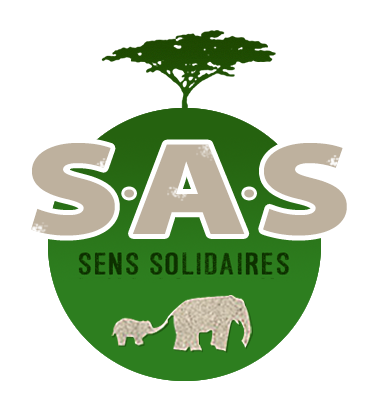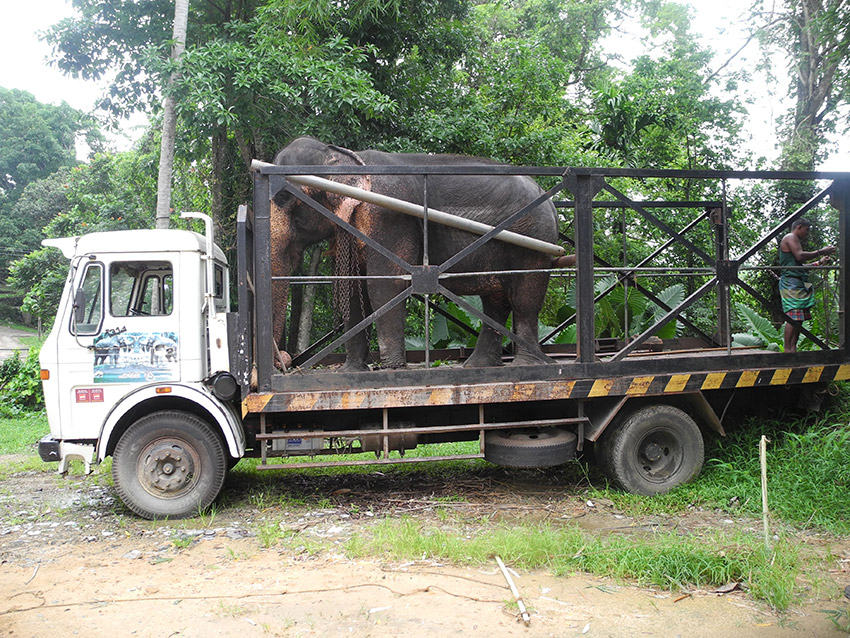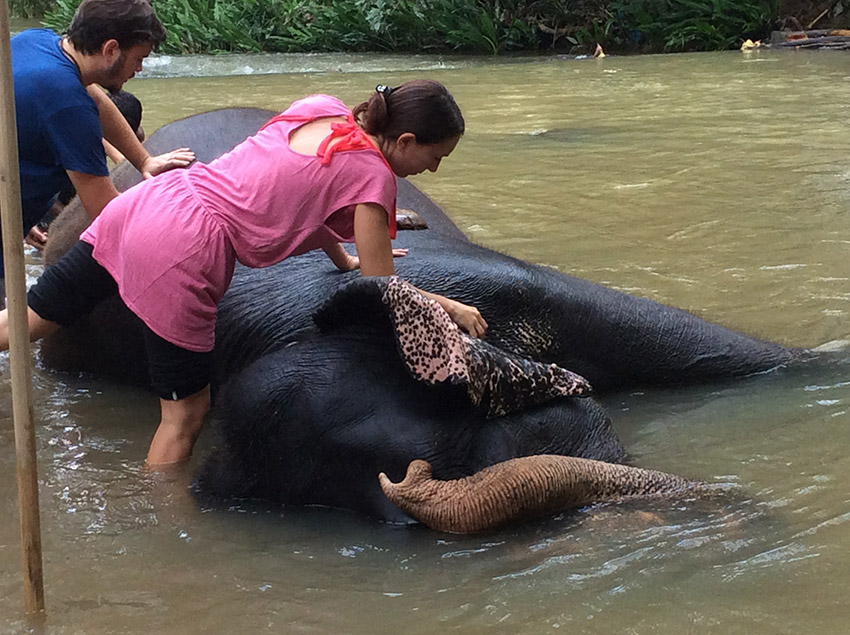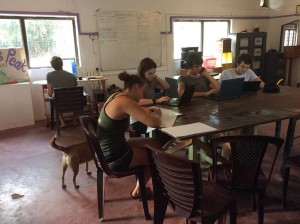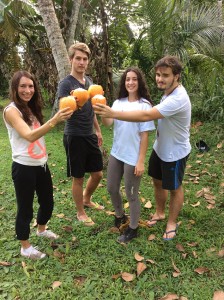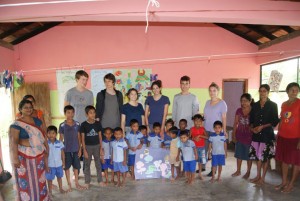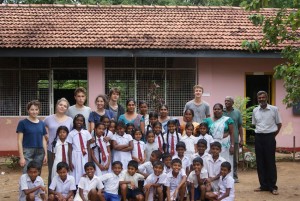International Volunteering In Sri Lanka
SAS supports the projects of the Elephant Foundation in Kegalle, which aims to protect the wild and domesticated elephants of Sri Lanka (created in 1999 with the help of WSPA, World Society for the Protection of Animals).
In Sri Lanka, there are approximately 5,000 wild elephants and 200 domesticated elephants.
The latter are mainly used for Buddhist religious celebrations and tourist rides.
The number of domesticated elephants is decreasing because the objective of Sri Lanka is to let them run free (also for financial reasons because the animal is expensive to maintain…).
The main activities of the volunteer missions are:
1. The management of the daily care of the domestic elephants of Kegalle as well as all the domestic elephants of the Island in residence in the foundation. In fact, the foundation transports free of charge on its truck all the domestic elephants that are ill and mistreated by their owners, following the diagnosis of the veterinarian.
These abused elephants are taken in at the Kegalle Foundation to be cared for.
Upon arrival, you will be assigned an elephant and under the guidance of the Mahout your daily tasks will be to work for the welfare of the elephant. This includes daily care such as feeding, medical treatment if necessary, bathing and grooming throughout your assignment.
As you get to know your elephant, you will also learn to recognize its sounds, movements, moods and feelings, individual traits and personality.
You will also learn to recognize the signs and symptoms if an illness occurs. This requires dedicated and responsible care. Volunteers will be able to assist the veterinarian and participate, depending on the calendar, in the great religious festivals “Peraheras” with our friends the elephants.
Other activities of the Foundation: Maintenance of the organic garden, assistance to the gardener, planting of fruit trees and medicinal plants to improve the nutrition of the elephants and the entire indigenous community.
More than 60 elephants have been housed there. Today, 4 females, aged between 21 and 65, are temporarily or permanently at the center. In the efforts and awareness to improve the situation of Sri Lankan elephants, the center welcomes volunteers!
The experience
Some elephants of the center
Lakshmi Her name means “Goddess of Prosperity” She is the Star of the Center! (Tarzan the Ape Man.). This 40 year old elephant has tons of energy and a passion for soft drinks! She gave birth to Sri Lanka’s first domesticated elephant, Pooja, who also lives at the center.
Pooja was born on August 5, 1984. She weighed 64kg at birth and was 52cm tall. Her father, Kandula, was a pet and died in an accident. Although she is now 26 years old, she is still considered by all MEF staff as the baby. Pooja is stubborn, and she loves to splash around in the river water, attracting the attention of her mahout and the other elephants.
Rani She arrived at the center in 2002, although she is approaching her thirties, she is a player. Her name means “queen” which suits her well. Her long legs make her one of the largest elephants at MEF. Rani enjoys the company of people, especially the ladies! Lemon-filled cookies are Rani and Pooja’s favorite treat.
Tikiri Kumari, whose name means “Little Princess”, was born in 1950 and came to the center in 2002 to keep her friend Kumara company while he was being treated for health problems. Tikiri Kumari is very playful; she loves to throw leaves on her head and play in the river while covering herself with sand. She has made a friend, Somaliya, and they often try to touch each other when they are near each other.
Sumana arrived at MEF in September 2008. Her condition required treatment because of her many wounds and sores. Since her arrival, she has been treated twice a day and is doing much better. Sumana is a sweet girl, she never complains, even when we treat her wounds often.
2. Support to the Habarana project: there are conflicts between humans and elephants due to the increasing settlement of villagers in the elephant corridor area.
To counteract this disharmony, the foundation has set up an educational program for farmers and children to conserve wildlife while improving the living conditions of the indigenous people. (thanks to the funds collected by the visit of the tourists to the foundation).
Explanation: The village of Weragala, is located between four national parks, and is entirely surrounded by jungle. This means that the village is right in the middle of an “elephant corridor” – the ancestral migration route of elephants. This makes Weragala a hot spot for conflict.
Wild elephants pass through this village between reserves in search of food and water. Often the elephants trample farmers’ land and consume the food. In a matter of hours, elephants destroy the farmers’ only means of livelihood after working long and hard to obtain it, and sometimes houses are broken.
Unfortunately for these farmers and their families, there is no compensation. We support farmers’ requests to build wooden tree houses to watch for elephants, like watchtowers, to better protect their crops.
As human populations continue to grow, more and more natural habitats are being converted to make way for roads, croplands, bridges, schools, houses, and new villages.
This means that the natural habitat where wild elephants live is greatly reduced and they often come into conflict with humans. Here, humans and elephants are competing for resources.
Last year in Sri Lanka, human-elephant conflict killed 200 elephants and 48 people -(source Sri Lanka Department of Forest Conservation).
The Asian elephant is an endangered species. In Sri Lanka, there are about 4-5,000 wild elephants. We need to find ways to protect these remaining wild elephants.
An effective conservation strategy to ensure the survival of the Asian elephant must take into consideration the needs of the indigenous people. Surveys have shown that if crop damage is kept to a minimum, farmers will not have conflicts with elephants.
Habaranna project: Based in the heart of this community, volunteers work closely with local farmers to help them reduce human-elephant conflict. Providing natural solutions for farmers. Organization of workshops: adult training, education on effective farming techniques to improve crop safety while providing new resources. Using traditional, more peaceful remedies can prevent crop damage while protecting elephants. Traditional methods are often used for economic reasons, but they are also more cost-effective in the long run for local people. We use edible crops, such as chilli and orange plants, which have been proven to keep elephants away, to form a protective buffer zone against hungry elephants. Bells and torches are provided to farmers to help them scare off elephants that come near their homes. Beehives are provided to families, as elephants are afraid of bees, and this allows communities to harvest their own honey. The goal is to help farmers change their view of wild elephants from being a pest to a source of income. For families who have suffered damage to their crops, their homes, etc. because of elephants, compensation is offered to help them through these difficult times. A program to build wells in schools so that children can have access to drinking water.
4. Education: setting up school correspondence with local schools and French schools, for a few hours a week volunteers help these children to write in English and make them aware of the issues of biodiversity conservation.
As a volunteer, you will have the opportunity to discover and immerse yourself in a different culture. You will be greeted by the warm and hospitable smile of the Sri Lankan people. You will have at least one day off per week depending on your workload. This will be an opportunity to discover the rich cultural heritage of Sri Lanka and especially the lush beauty of its nature.
Cost of the mission
Cost of a mission (excluding airfare) : 1100 EUROS + 25 EUROS MEMBERSHIP FEE OR 382 EUROS AFTER TAX DEDUCTION.
*The expenses of missions are tax deductible. Article 200 and 238 bis of the general tax code.
- 10, 15 days to 1 month maximum
During your volunteer mission, SAS takes care of the transfer from the airport to the mission base, your supervision during the solidarity mission with the communities, overnight stays, morning, noon and evening meals and local transportation.
The approximate additional costs of the mission: airfare (600 euros), visa (25 euros), vaccines and mandatory medication (100 euros). These costs are tax deductible. SAS organizes a mandatory pre-departure training day either remotely or in our offices. The training is given by international solidarity graduates (Bioforce Lyon Humanitarian Institute).
We organize short missions to allow an effective immersion on the community projects that will be entrusted to you. You are then free to extend your stay and discover the country. You are responsible for the cost of activities on your day off.
Flight cancellation and medical and/or repatriation insurance (including Covid 19) are mandatory.
Do not hesitate to contact me for any further information. Good preparation for the mission!
Delphine Thibaut
Phone : 06 73 76 60 13
contact@sensolidaire.org
Useful informations
- Formalities
You will need a valid passport (more than 6 months). Visa is mandatory but can be obtained on arrival for some countries.
Advice for airlines to find you the best price: Turkish airlines, Air France, Emirates.
- Santé
Up-to-date vaccines, hepatitis A recommended, your usual medication, sun protection, sunglasses, a local disinfectant, medication for intestinal problems, a multipurpose antibiotic, eye drops, painkillers, bandages, water purification tablets. Mosquito repellent ….
- Tips for travelers
